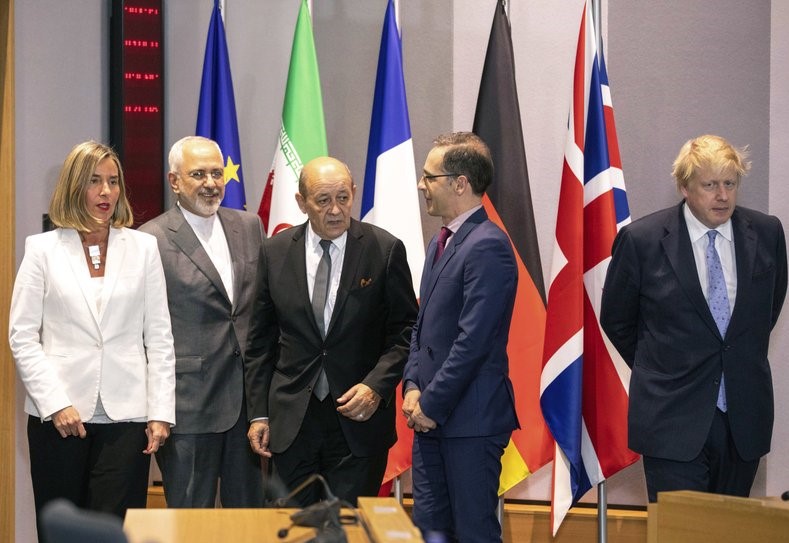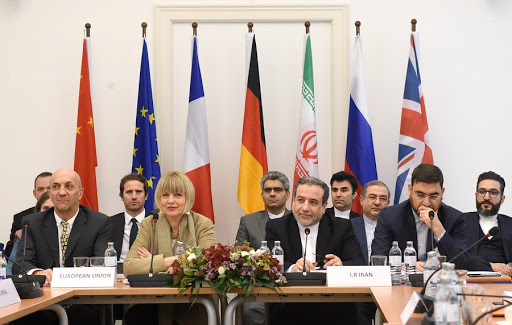
PEJOURNAL – Strategic Think Tank of explanation- A recent report from the Carnegie think tank has assessed the possibility of extending the JCPOA to a collective security plan in West Asia by Europe. The think tank is one of America’s most famous think tanks in the field of public policy that founded in 1910 by Andrew Carnegie, a Scottish capitalist in the steel market, with the aim of expanding US international cooperation, it now has branches in the European Union, Russia, China and Lebanon in addition to the United States.
This report was written by Cornelius Adebahr, a researcher at the institute in Brussels, who had previously listed JCPOA as the result of a multilateralism approach to European foreign policy (Iran and the European Union: A Nuclear Agreement and Beyond, published in the spring of 2017).
Iran, problem or solution?
Referring to the failure of the US “maximum pressure” policy, the author considers Trump’s regional policies in West Asia to be against Europe’s security interests and adds that outsourcing the US strategy to Tel Aviv and Riyadh and moving in the interests of the two governments such as supporting Saudi Arabia in aggression to Yemen or the assassination of General Soleimani has shaken the will of the international community to destroy ISIS.
Events such as the US limited withdrawal from northeastern Syria, the agreement with the Taliban and the government’s disagreement with Al-Saud on the oil market, and the need to direct US resources inward to curb Corona, seem has been highlighted the gradual withdrawal of US troops from west Asia. The author advises the European Union to use this opportunity to regain its leadership in international security and to take a multilateral approach to regional security.
The report adds that JCPOA achieved three EU strategic goals for Iran: banning nuclear weapons, preventing a full-scale war in the region, and proving Europe’s international capability, but the US withdrawal from the JCPOA that path unfinished. The article claims that JCPOA defect of focus on its nuclear program has silenced other disputed areas in North Africa and West Asia, including the wars in Libya, Syria and Yemen.
But if Iran is seen as part of the solution rather than a problem, one can take advantage of the decline of the US leadership to achieve a regional peace plan So that the mistake of the European troika in cooperating with the United States in the occupation of Iraq can be compensated.
If Iran is seen as part of the solution, not the problem, one can take advantage of the decline of the US leadership to achieve a regional peace plan, so that the mistake of the European troika in cooperating with the United States in the occupation of Iraq can be compensated.

Europe needs a paradigm shift
The author sees the time as right (good) for the EU to adopt a more strategic and unified foreign policy. At the same time, he points out that Europe should not waste time waiting for a change of government in the US presidential election for three reasons, and should also take a passive approach:
First, Trump is unlikely to win.
Secondly, unexpected events may occur in the period before the election, such as the attack on the Saudi Aramco facility or the assassination of General Soleimani, which will push the states involved to the threshold of war.
Third, it will become more difficult to reach a consensus, as the deadline for the suspension of the Security Council arms embargo against Iran in October 2020.
The article goes on to write that the European Union must change its paradigm for security in West Asia and take a different approach from the US. The United States seeks to force the Resistance Front to retreat from regional positions, but not only does it not stand up to the developmental demands of the Zionist regime, Saudi Arabia, the UAE, or Turkey, but it sided with them. While the author believes that any security plan should be sensitive to public intervention of actors.
JCPOA, the starting point
The author states that JCPOA can still be used as a foundation of security architecture in West Asia. Giving details of steps to reduce nuclear commitments, he claims that Iran’s time to acquire nuclear weapons, which had increased from three months to at least a year, has sharply decreased and this has caused concern among western allies in the region.
Referring to the efforts of regional governments to acquire nuclear technology, the article adds that Saudi Arabia has auctioned off plans to build nuclear reactors from companies from the United States, Russia, China, France and South Korea; The UAE commissioned a reactor purchased from South Korea in March 2020; Turkey has begun construction of the first reactor, and Egypt and Jordan are in talks with Russia.
The EU must change its paradigm for security in West Asia and take a different approach from the US.
Concerned about the military dimension of the Saudi-UAE nuclear program, the author suggests to the European Union and Britain that by persuading the eight governments of Iran, Saudi Arabia, the United Arab Emirates, Iraq, Bahrain, Kuwait, Qatar and Oman to take the following steps, generalize the terms of the JCPOA to the governments of the Persian Gulf:
1. Temporary implementation of the Additional Protocol
2. Shutdown of any Pu heavy water reactor
3. Uranium enrichment limit to 5%
4. Delivering enriched uranium to a nuclear fuel bank in the region and receiving it under the oversight of peaceful uses
5. Ratification of international conventions related to nuclear safety
.6 Determining the peaceful and non-peaceful activities of the nuclear program on the basis of similar oversight by JCPOA
The report recommends to the European Union to satisfy Iran and revive JCPOA by developing INSTEX. in addition to the author’s disregard for Europe’s practical alignment with US sanctions, it’s not logical to limit the nuclear program of Muslim states and increase oversight over NPT to them, regardless of the nuclear arsenals of the Zionist regime, which has not even accepted NPT.
Collective security in the Persian Gulf
The author believes that after overcoming concerns about the nuclear arms race between the eight governments, a longer-term plan for regional security can be considered. Given that the United States cannot mediate these countries due to enmity with Iran, so the European Union and Britain should present a suitable plan that part of the draft of these negotiations can be the contents of the four axes of the “Hormuz Peace” plan, non-aggression, non-intervention, security energy and freedom of shipping.
The article recommends that in addition to China and Russia as permanent members of the Security Council, India, Japan and South Korea as major buyers of Persian Gulf oil also participate in these negotiations. The negotiations will also be based on the adoption of the 1982 UN Convention on the Rights and Responsibilities of States in the High Seas. In this regard, countries of negotiations monitoring should encourage the eight governments of Iran, Saudi Arabia, Iraq, the UAE, Qatar, Kuwait, Oman and Bahrain to following actions:
1. Approval of the Comprehensive Nuclear-Test-Ban Treaty
2. Adopt a regional treaty to prevent the development of chemical and biological weapons
3. Reduce the range of ballistic missiles to a maximum of 2,000 kilometers
4. Ratification of the Conventional Arms Trade Monitoring Convention adopted by the United Nations in 2014
5. Adopt a regional treaty on the need for transparency and informing each other about maneuvers and the level of military equipment
The author cites the mass summoning of ambassadors, the reduction of relations to the consular level, and the eventual disconnection of the European Union with the violating governments as guarantees for the implementation of this plan of collective security, and once again, it neglects the mass killing equipment of the occupying regime in The Palestinian, which is backed by the US and Europe.
Part of the draft of these talks could be the contents of the four axes of the “Hormuz Peace” plan, namely non-aggression, non-intervention, energy security and freedom of navigation.
Conclusion
There will be hints about the possibility of implementing such proposals.
First, Europe’s inaction in the face of US “maximum pressure” on Iran shows that these countries lack the political will to pursue an independent foreign policy.
Second, it is unlikely that Britain will continue to pursue its foreign policy within EU after Brexit.
Third, the focus on disarming the Gulf states and not including Turkey, Egypt and the Zionist regime will not only be acceptable to Iran, but will also face serious opposition from Saudi Arabia, the UAE, Qatar and Iraq.
Fourth, it will not go beyond stereotype rhetoric, any regional negotiations on disarmament before the end of the fight against terrorism in Iraq and Syria and the war in Yemen. Any plan in this regard must first address the role of regional crises.
Fifth, any regional security plan that has silenced the old Palestinian wound and has no proposal for a comprehensive and permanent solution will remain fruitless. Without the restoration of the land of Palestine, no peace in West Asia will be lasting.